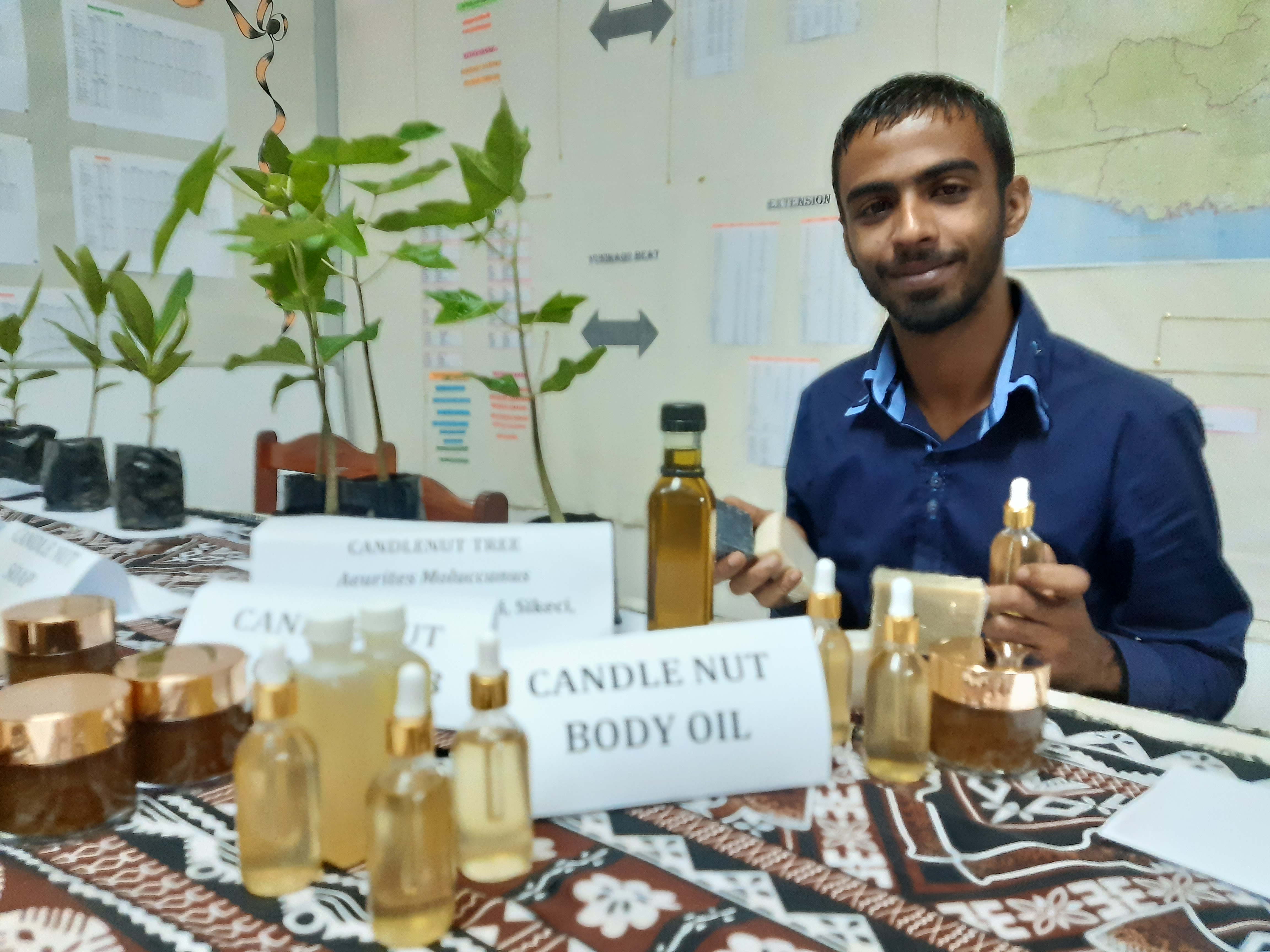
Averyl focuses on minor forest products
FOR 22-year-old Averyl Avchial being one step ahead of his father has brought him a long way.
With support from the Ministry of Forestry and his team at Kemasu Farm in Waidalice, Averyl is now on his way to becoming a millionaire – probably the youngest one in Fiji if all goes according to plan.
The young entrepreneur owns Averyl (Fiji) - a business which manufactures candlenut soap, candle sugar scrub and candlenut oil to name a few. Candlenut is produced by the Lauci tree which is also locally known as the following names: toto, sikeci, tuitui, qereqere and waiwai.
“It has been slightly more than one year now that I have been running this business and I am grateful for the support rendered by the Ministry of Forestry and most importantly my family at Kemasu Farm in Waidalice,” Averyl said.
He has so far managed to plant 10,000 Lauci trees in Kemasu Farm which he considers as his engine room.
“I am lucky to have the support of Keresoni and Susana Ramuwai who have given me 50 hectares of land to use to plant Lauci trees in addition to other crops,” he said.
Averyl met up with the couple through their church gatherings and was surprised when they decided to give him a piece land so that he could start his business venture. The couple have reigned in youth from around the area and family members to help toil their 250 hectares of land.
“We have given Averyl 50 hectares for his business venture and he has only used a portion of it with the 10,000 Lauci trees that are already planted,” Mr Ramuwai said.
“We will support him all the way because we know that through this business partnership with Government, we will also benefit financially,” he added.
Mr Ramuwai said because of Averyl’s young age, he is also setting a good example for the six youth who are helping out at the farm.
“Am sure these youth will also follow in Averyl’s footsteps and make use of the land that is lying idle back in their villages.”
Averyl’s company manufactures the products at Baulevu outside Nausori and also in Raviravi in Ba and are sold in supermarkets like Hansons across Fiji.
“I hope to venture into the Malaysian market with my products as candlenut is a billion dollar industry there but I will take one step at a time,” Averyl said.
According to the book “A Guide to Some Indigenous Fijian Trees”, the Lauci tree is believed to have been introduced by the early Fijian settlers. It is indigenous to Malaysia but has also become so well naturalized in many parts of the south-east Asia, Melanesia and Polynesia that its exact native range is difficult to establish.
According to this young entrepreneur - Averyl, research has shown that Lauci trees have health benefits like improving the digestive system, providing relief to fungal infections, contributing to reducingheart diseases, assists in overcoming insomnia, treats tooth ache and reduces weight loss.
“I want to encourage the youth around Fiji to make use of the idle land that is available in their villages. There are ways and means to get assistance to venture into a business like me,” Averyl said.
“Nothing is impossible if the heart is willing.”
Ministry of Forestry’s Permanent Secretary Mr Pene Baleinabuli said Averyl is one of the great examples of a youth determined to succeed despite life’s challenges.
“He is venturing into scented oils and soaps using trees like Lauci or Candlenut, Dilo and other plant based products,” Mr Baleinabuli said.
“Averyl realizes the benefits that trees could provide and is making great traction in generating revenue.”
“The Ministry is supporting the growing of trees and plants that are considered minor forest products or non-wood forest products as these are not only beneficial to the environment but also to the communities because the returns from such products could be realized at a shorter time.”
“The beauty of minor forest products and non-wood forest products is that the trees are not cut down, people only harvest the fruits and this is good for both the environment and for socio-economic purposes.”
Mr Baleinabuli added the Ministry of Forestry is also working with the Ministry of Youth and Sports to meaningful engage young people in both rural and urban areas to plant trees and explore the many opportunities to make a living from natural resources.
Ends